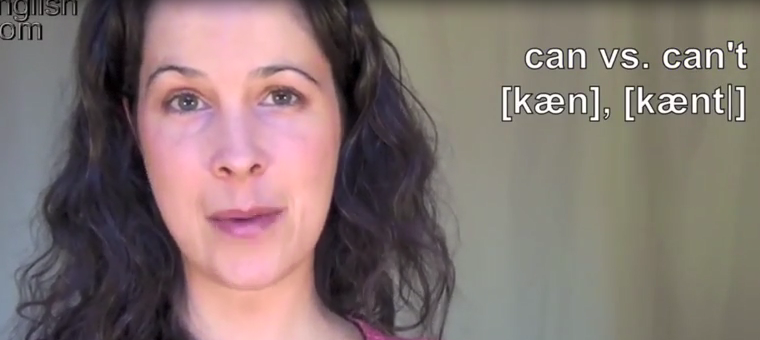(单词翻译:单击)
Today I'm going to talk about the difference between can and can't. How to hear it, how to say it.
今天我要讲一下“can”和“can't”之间的区别,如何听以及如何说。
You've probably noticed that you cannot rely on hearing -- tt -- a good T sound because most Americans when they're speaking everyday speech --tt -- don't release final Ts.
你可能已经注意到了并不能根据是否听到T的音来判断,因为大多数美国人日常讲话时并不一定会发出最后T的音。
First of all, if you haven't seen the video onN'T contractions, watch that first.
首先,如果你没有看关于N'T缩略的视频,那么先去看那个。
In that video, you learned that theN'T is pronounced nt.
在那个视频中,你会学到N'T的发音是nt。
A nasal N sound here in the nose cut very short byt a stop T.So let's compare the two words. Can. Can't. Can, can't.
鼻音N被停顿T切割的很短。所以让我们来比较一下这两个单词。Can. Can't. Can,can't.
What do you hear being different? Let's not even limit ourselves to just the sounds, but anything. Can, can't.
你听到了什么不同?我们不要仅局限于发音,而是整个单词。Can,can't.

Can you tell that the first word is longer?
你能听出来第一个单词发音更长一点吗?
The stop T of can't chops it, makes it a little bit more abrupt. Can, can't.
“can't”中的停顿T砍掉了一部分发音,使其结尾更突然。Can,can't.
This may be something that is difficult for you to distinguish right now.
现在你可能会觉得很难区分。
But if you know to listen for can: a little bit longer, a little smoother, versus can't, can't: a little shorter, a little bit more abrupt, it may help you develop an ear for this.
但是如果你知道相比较而言,“can”更长一点更平顺一点,而“can't”更短一点更突然一点,就会有助于你听出来这两者的差别。
A note on the pronunciation of the word can. You've probably noticed that this word often reduces.
关于单词“can”发音的一个笔记。你可能已经注意到了这个单词经常略读。
The 'aa' as in 'bat' vowel is changed to the schwa. Kn (loop three times), I can do it, kn.
本来相当于“bat”中的元音aa变成了弱元音。“kn”(循环三次)I can do it,kn.
The word can't does not reduce. That vowel sound never changes into the schwa sound.
而单词“can't”却不进行略读。这里的元音并没有变成弱元音。
So that's another way to help you distinguish between these two words.
所以这是另一个区分这两个单词的方法。
Let's look at some sentences.I can understand. I can't understand.
我们来看一些句子。我明白。我不明白。
Could you hear the difference? I can understand. I can't understand. Can, can't. (loop two times)
你能听出其中的不同吗?I can understand. I can't understand. Can,can't(循环两次)
The vowel sound is different because in the first sentence it's being reduced to the schwa.
元音是不同的,因为在第一个句子中它被弱读成了弱元音。
And here. Can you help later? I can't. I can. (loop two times)
还有这个。Can you help later?I can't. I can.(循环两次)
Do you sense that the first response is a little bit more abrupt? I can't. (loop two times) And the second one a little bit more relaxed. Can (loop three times), a little smoother.
你有发现第一个回答有一点突然吗?“I can't.”(循环两次)而第二个则更放松。“can”(循环三次),更平顺。
That one might have been a little harder because the vowel didn't change.
这一个可能会更难一点因为元音并没有变化。
I told her I can't. I told her I can. Again, the vowel is the same in both of them. I told her I can't. I told her I can.
I told her I can't. I told her I can。这里两者的元音也是一样的。I told her I can't. I told her I can.
But do you notice that the last can, can: a little smoother and a little longer? I told her I can't. More abrupt in that first sentence.
但是你有注意到后面那个“can”更平顺更长一点吗?I told her I can't. 第一个句子里的则更突然一点。
You can come. You can't come. (loop two times) In the first sentence the word can is reduced so much -- kn (loop four times) -- You can come. It's almost not even there.
You can come. You can't come. (循环两次)第一个句子里的“can”弱读了很多,“kn”(循环四次),You can come. 听起来几乎没有元音了。
You can come. You can't come.
你能来。你不能来。
So the two tricks here are: 1) If the sound is abrupt and chopped, can't (loop two times), then it's the word can't.
所以这里有两个诀窍:1) 如果音节短促突然,“can't”,那就是单词“can't”。
And 2) if the vowel sound changes to the schwa, then it's the word can. Kn (loop two times), I can do it.
2) 如果元音变成了弱元音,那么就是单词“can”。“kn”(循环两次)I can do it.
That's it, and thanks so much for using Rachel's English.
这次的学习就到这里,非常感谢使用Rachel's English。


